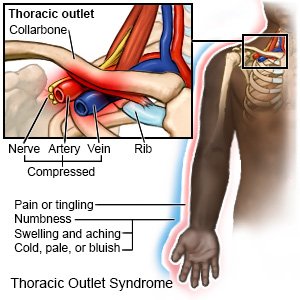Thoracic Outlet Syndrome
Medically reviewed by Drugs.com. Last updated on Aug 4, 2025.
Thoracic outlet syndrome (TOS) occurs when nerves or blood vessels are pinched in the thoracic outlet. The thoracic outlet is the area between your collarbone and your first rib. Nerves and blood vessels run through the thoracic outlet as they go from your chest out to your hands.
 |
DISCHARGE INSTRUCTIONS:
Physical therapy:
A physical therapist teaches you exercises to strengthen the muscles in your neck, shoulders, and back. This can help increase the amount of room in the thoracic outlet. These exercises can also help improve your posture and decrease pain.
Self-care:
- Practice correct posture.
- Do not sleep with your arms above your chest.
- Avoid activities that involve repeated movements.
- Do exercises as directed to strengthen and stretch your shoulder and neck muscles.
Related medications
Medicines:
You may need any of the following:
- Nonsteroidal anti-inflammatory (NSAID) medicine may decrease swelling or pain. This medicine can be bought with or without a doctor's order. NSAIDs can cause stomach bleeding or kidney problems in certain people. If you take blood thinner medicine, always ask your provider if NSAIDs are safe for you. Always read the medicine label and follow the directions on it before using this medicine.
- Muscle relaxers or other medicines to decrease nerve pain may be needed. Ask your provider for more information about these medicines.
- Prescription pain medicine may be given to decrease pain. Do not wait until the pain is severe before you take this medicine.
- Take your medicine as directed. Contact your healthcare provider if you think your medicine is not helping or if you have side effects. Tell your provider if you are allergic to any medicine. Keep a list of the medicines, vitamins, and herbs you take. Include the amounts, and when and why you take them. Bring the list or the pill bottles to follow-up visits. Carry your medicine list with you in case of an emergency.
Follow up with your healthcare provider in 3 to 4 weeks:
Your provider may refer you to an orthopedic, neurologic, or other specialist. Write down your questions so you remember to ask them during your visits.
Contact your healthcare provider if:
- You have new pain, numbness, or tingling in your neck, shoulder, arm, or hand.
- You have a weak grip that is new for you.
- One hand looks smaller than the other.
- You have questions or concerns about your condition or care.
Return to the emergency department if:
- You have severe pain.
- Your arm or hand aches or feels heavy.
- Your arm or hand feels cold, or looks pale or blue.
© Copyright Merative 2025 Information is for End User's use only and may not be sold, redistributed or otherwise used for commercial purposes.
The above information is an educational aid only. It is not intended as medical advice for individual conditions or treatments. Talk to your doctor, nurse or pharmacist before following any medical regimen to see if it is safe and effective for you.
Learn more about Thoracic Outlet Syndrome
Treatment options
Care guides
Further information
Always consult your healthcare provider to ensure the information displayed on this page applies to your personal circumstances.
